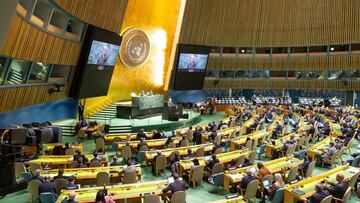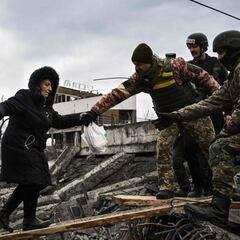What does the UN general assembly vote mean?
A resolution passed by a huge majority at the United Nations calls on Russia to immeidately withdraw from Ukraine, but what effect will the vote have on Putin?


Earlier this week the United Nations overwhelmingly voted to pass a resolution decrying the invasion of Ukraine and calling for an immediate end to Russia’s military activities in the country.
The vote on Wednesday saw 141 of the UN’s 193 member states vote in favour of the resolution, while 35 countries opted to abstain from the vote. The only nations to vote against the resolution were Belarus, North Korea, Eritrea and Syria, along with Russia.
The resolutio passed is not legally binding but it does present a formal confirmation of the worldwide outrage and opposition to the Russian invasion. It also highlighted the increasing isolation of Russia on the global stage. Those who voted in favour will hope that the resolution piles more pressure on Moscow to withdraw troops.
See also:
- Russia-Ukraine conflict: live updates
- How to support Ukraine amid the Russian attack
- Fox News' Tucker Carlson receives backlash after Putin support
- Ukraine jets strike Russian military convoy
- What is a no-fly zone?
In response to the resolution the Russian representative to the UN, Vasily Nebenzya, reiterated claims from the Kremlin that its military action was not targeting civilian areas. He forwarded baseless accusations that Ukrainian allies had coerced members into voting in favour of the resolution.
The Russian attitude in the face of mounting pressure from the global community appears stoic but there is hope that the resolution will act as a rallying cry. Reports suggest that President Putin was not anticipating such a unified and cohesive response from other nations and the passage of the resolution may precede further economic sanctions against Russia.
Massive protests in Ukrainian cities occupied by Russia, making short work of Putin’s outlandish claims that the @UN-condemned invasion is “liberation.” This is Kherson after the Russian conquest pic.twitter.com/jv5pXrLGAc
— Bojan Pancevski (@bopanc) March 5, 2022
What was in the UN’s resolution against Russia?
In a statement release on the UN website the resolution is said to reaffirm “Ukrainian sovereignty, independence and territorial integrity.” The language employed criticises Russia in harsh terms and makes clear that the vast majority of UN members wants the invasion to stop.
The resolution calls on Moscow to “immediately, completely and unconditionally withdraw all of its military forces from the territory of Ukraine within its internationally recognized borders.”
Of particular importance to member states was then impact that the conflict is having on Ukrainian civilians, something that has increased in recent days. Having initially been frustrated by the stout defence of Ukraine, Russia has become less discriminate it its attacks and is clearly targeting non-military target.
The United Nations Security Council held an emergency session after Russian forces attacked Europe's largest nuclear power plant. https://t.co/9UOA21rW4Z pic.twitter.com/XCvj06tMEg
— ABC News (@ABC) March 5, 2022
The resolution cites “reports of attacks on civilian facilities such as residences, schools and hospitals, and of civilian casualties, including women, older persons, persons with disabilities, and children.”
Related stories
Shortly after the resolution was passed UN Secretary-General António Guterres spoke to reporters and reiterated its content, emphasising that he would stand by the resolution.
He said: “The message of the General Assembly is loud and clear: End hostilities in Ukraine now. Silence the guns now. Open the door to dialogue and diplomacy now.”

